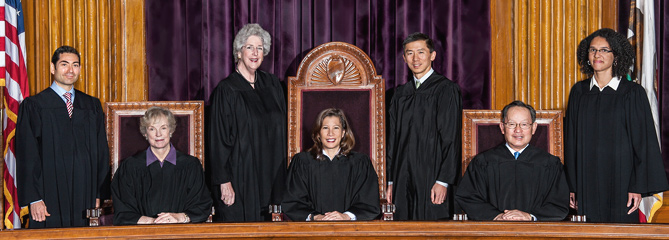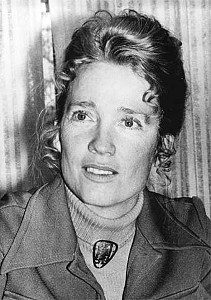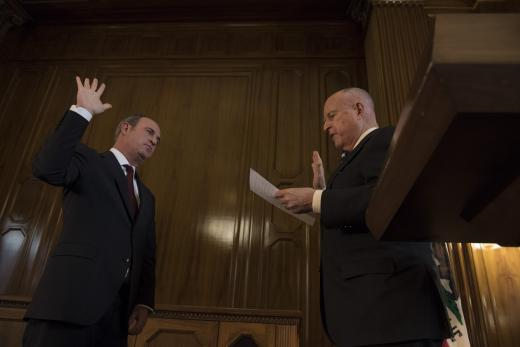
California Supreme Prejudice
The conscious biases of Chief Justice Tani Cantil-Sakauye
By Lloyd Billingsley, March 20, 2019 6:54 pm
“Thanks to Governor Brown, who breathed new life into the judiciary with 600 plus judicial appointments, 200 of those in his final year. In the last year, these new appointees self-report that 41 percent are non-white and over half of these appointments are female. This is to let you know that the judiciary now is more representative of the communities we serve in every way.”

That was California Supreme Court Chief Justice Tani Cantil-Sakauye, in her Tuesday March 19 State of the Judiciary address. The Chief Justice also backed mandatory “unconscious bias training” for all jurists and said “I plan on taking the first class.” Californians have reason to believe her biases might need attention.
Voter-approved state law, the 1996 Proposition 209, bans racial and ethnic preferences in state education, employment and contracting. Yet, for the Chief Justice, a representative judiciary is entirely a matter of gender and skin shade. A judiciary that is more representative “in every way,” would take into account other factors, such as a community’s attitude toward crime. On that theme, Chief Justice Cantil-Saukauye also shows a certain bias against the presumption of innocence.
Last December, she gave up her Republican Party registration over the confirmation hearings for Supreme Court nominee Brett Kavanaugh. The Chief Justice wondered why Republicans would bring in a female prosecutor to question Christine Blasey Ford. For the most casual observer, that was to find out if her story that a drunken Kavanaugh sexually assaulted her more than 30 years ago was true or false. California’s Chief Justice also has a problem distinguishing criminals from non-criminals.
In 2017, Cantil-Saukaye wrote a letter to Attorney General Jeff Sessions and DHS Secretary John Kelly stating: “As Chief Justice of California responsible for the safe and fair delivery of justice in our state, I am deeply concerned about reports from some of our trial courts that immigration agents appear to be stalking undocumented immigrants in our courthouses to make arrests. Our courthouses serve as a vital forum for ensuring access to justice and protecting public safety. Courthouses should not be used as bait in the necessary enforcement of our country’s immigration laws.”
Sessions and Kelly replied that “stalking” has “specific legal meaning in American law,” and it was “criminal activity.” On the other hand, “the arrest of persons in a public place based on probable cause has long been upheld by the United States Supreme Court,” as U.S. v. Watson confirmed.
A repeatedly deported criminal calling himself Jose Inez Garcia Zarate, and many other names, was in custody but not turned over to ICE. In July 2015, this illegal felon gunned down Kate Steinle on a San Francisco pier. The state Supreme Court is in San Francisco but the killing of an innocent 32-year-old woman did not prompt Tani Cantil-Sakauye to write a letter challenging the city’s sanctuary policies.
When brokering her change of registration, Cantil-Sakauye described herself open-minded on social justice issues and praised the judicial appointments of governor Jerry Brown as “people-centric” and “underdog-centric.” It was all about “what are we going to do about homelessness, what are we going to do about climate, what are we going to do about guns.”
To Californians, that might sound more like the political agenda of a legislator, not an impartial judge. On the other hand, in California, justices of the Supreme Court must sometimes face the voters.

Governor Jerry Brown’s first choice for Chief Justice of the California Supreme Court was his former campaign chauffer Rose Bird, only 40 years old and without judicial experience. In 10 years Chief Justice Bird heard 64 capital cases and never voted to uphold a single death sentence. She overturned the sentence of Theodore Frank, who raped, murdered and mutilated two-year-old Amy Sue Seitz in 1978.
In 1979, Eleanore Buchanan of San Diego was 24 and had given birth to her second child only three weeks before she was abducted by Bernard Lee Hamilton, who beheaded the woman and cut off both her hands. The Bird court found no evidence that Hamilton intended to kill Buchanan and duly reversed his death sentence.
On November 4, 1986, by a two-to-one margin, voters ousted Rose Bird, the only chief justice in state history to be removed by a vote of the people. Voters also booted justices Cruz Reynoso and Joseph Grodin, both Jerry Brown appointees, who sided with Bird on the death-penalty cases.
Theodore Frank died in prison of natural causes in 2001. Bernard Lee Hamilton died in prison of natural causes in 2016 and governor Gavin Newsom recently reprieved all 737 inmates awaiting execution in California. Dan Morain of CALmatters asked the Supreme Court how the justices would deal with the reprieve and moratorium but “there was no response.”
That gives crime victims good cause to keep watch on the court. In 2023, when her term expires, California voters can make the call on Chief Justice Cantil-Sakauye.




